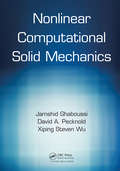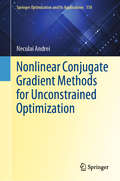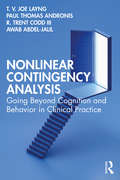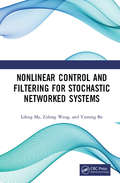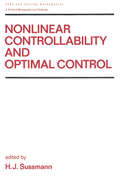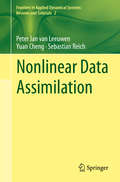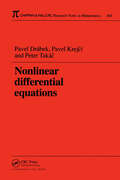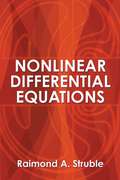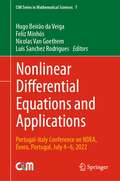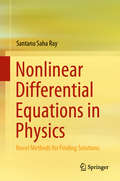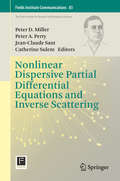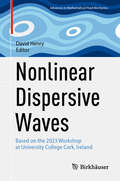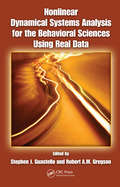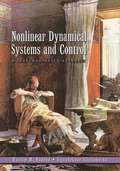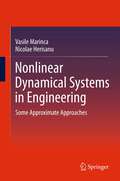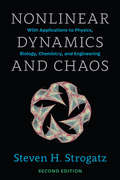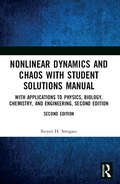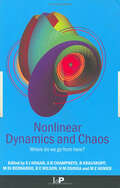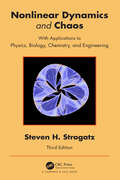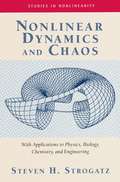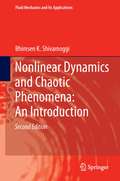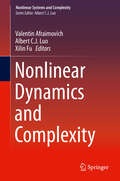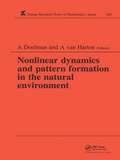- Table View
- List View
Nonlinear Computational Solid Mechanics
by Jamshid Ghaboussi David A. Pecknold Xiping Steven WuThis book presents the fundamentals of nonlinear mechanics within a modern computational approach based mainly on finite element methods. Both material and geometric nonlinearities are treated. The topics build up from the mechanics of finite deformation of solid bodies through to nonlinear structural behaviour including buckling, bifurcation and snap-through. The principles are illustrated with a series of solved problems. This book serves as a text book for a second year graduate course and as a reference for practitioners using nonlinear analysis in engineering and design.
Nonlinear Conjugate Gradient Methods for Unconstrained Optimization (Springer Optimization and Its Applications #158)
by Neculai AndreiTwo approaches are known for solving large-scale unconstrained optimization problems—the limited-memory quasi-Newton method (truncated Newton method) and the conjugate gradient method. This is the first book to detail conjugate gradient methods, showing their properties and convergence characteristics as well as their performance in solving large-scale unconstrained optimization problems and applications. Comparisons to the limited-memory and truncated Newton methods are also discussed. Topics studied in detail include: linear conjugate gradient methods, standard conjugate gradient methods, acceleration of conjugate gradient methods, hybrid, modifications of the standard scheme, memoryless BFGS preconditioned, and three-term. Other conjugate gradient methods with clustering the eigenvalues or with the minimization of the condition number of the iteration matrix, are also treated. For each method, the convergence analysis, the computational performances and the comparisons versus other conjugate gradient methods are given. The theory behind the conjugate gradient algorithms presented as a methodology is developed with a clear, rigorous, and friendly exposition; the reader will gain an understanding of their properties and their convergence and will learn to develop and prove the convergence of his/her own methods. Numerous numerical studies are supplied with comparisons and comments on the behavior of conjugate gradient algorithms for solving a collection of 800 unconstrained optimization problems of different structures and complexities with the number of variables in the range [1000,10000]. The book is addressed to all those interested in developing and using new advanced techniques for solving unconstrained optimization complex problems. Mathematical programming researchers, theoreticians and practitioners in operations research, practitioners in engineering and industry researchers, as well as graduate students in mathematics, Ph.D. and master students in mathematical programming, will find plenty of information and practical applications for solving large-scale unconstrained optimization problems and applications by conjugate gradient methods.
Nonlinear Contingency Analysis: Going Beyond Cognition and Behavior in Clinical Practice
by R. Trent Codd, III T. V. Layng Paul Thomas Andronis Awab Abdel-JalilNonlinear Contingency Analysis is a guide to treating clinically complex behavior problems such as delusions and hallucinations. It’s also a framework for treating behavior problems, one that explores solutions based on the creation of new or alternative consequential contingencies rather than the elimination or deceleration of old or problematic thoughts, feelings, or behaviors. Chapters present strategies, analytical tools, and interventions that clinicians can use in session to think about clients’ problems using decision theory, experimental analysis of behavior, and clinical research and practice. By treating thoughts and emotions not as causes of behavior but as indicators of the environmental conditions that are responsible for them, patients can use that knowledge to make changes that not only result in changes in behavior, but in the thoughts and feelings themselves.
Nonlinear Continuum Mechanics for Finite Element Analysis
by Javier Bonet Richard D. WoodDesigning engineering components that make optimal use of materials requires consideration of the nonlinear characteristics associated with both manufacturing and working environments. The modeling of these characteristics can only be done through numerical formulation and simulation, and this requires an understanding of both the theoretical background and associated computer solution techniques. By presenting both nonlinear continuum analysis and associated finite element techniques under one roof, Bonet and Wood provide, in the new edition of this successful text, a complete, clear, and unified treatment of these important subjects. New chapters dealing with hyperelastic plastic behavior are included, and the authors have thoroughly updated the FLagSHyP program, freely accessible at www. flagshyp. com. Worked examples and exercises complete each chapter, making the text an essential resource for postgraduates studying nonlinear continuum mechanics. It is also ideal for those in industry requiring an appreciation of the way in which their computer simulation programs work.
Nonlinear Control and Filtering for Stochastic Networked Systems
by Zidong Wang Lifeng Ma Yuming BoIn this book, control and filtering problems for several classes of stochastic networked systems are discussed. In each chapter, the stability, robustness, reliability, consensus performance, and/or disturbance attenuation levels are investigated within a unified theoretical framework. The aim is to derive the sufficient conditions such that the resulting systems achieve the prescribed design requirements despite all the network-induced phenomena. Further, novel notions such as randomly occurring sensor failures and consensus in probability are discussed. Finally, the theories/techniques developed are applied to emerging research areas. Key Features Unifies existing and emerging concepts concerning stochastic control/filtering and distributed control/filtering with an emphasis on a variety of network-induced complexities Includes concepts like randomly occurring sensor failures and consensus in probability (with respect to time-varying stochastic multi-agent systems) Exploits the recursive linear matrix inequality approach, completing the square method, Hamilton-Jacobi inequality approach, and parameter-dependent matrix inequality approach to handle the emerging mathematical/computational challenges Captures recent advances of theories, techniques, and applications of stochastic control as well as filtering from an engineering-oriented perspective Gives simulation examples in each chapter to reflect the engineering practice
Nonlinear Controllability and Optimal Control
by SussmannThis outstanding reference presents current, state-of-the-art research on importantproblems of finite-dimensional nonlinear optimal control and controllability theory. Itpresents an overview of a broad variety of new techniques useful in solving classicalcontrol theory problems.Written and edited by renowned mathematicians at the forefront of research in thisevolving field, Nonlinear Controllability and Optimal Control providesdetailed coverage of the construction of solutions of differential inclusions by means ofdirectionally continuous sections ... Lie algebraic conditions for local controllability... the use of the Campbell-Hausdorff series to derive properties of optimal trajectories... the Fuller phenomenon ... the theory of orbits ... and more.Containing more than 1,300 display equations, this exemplary, instructive reference is aninvaluable source for mathematical researchers and applied mathematicians, electrical andelectronics, aerospace, mechanical, control, systems, and computer engineers, and graduatestudents in these disciplines .
Nonlinear Data Assimilation
by Sebastian Reich Peter Jan Van Leeuwen Yuan ChengThis book contains two review articles on nonlinear data assimilation that deal with closely related topics but were written and can be read independently. Both contributions focus on so-called particle filters. The first contribution by Jan van Leeuwen focuses on the potential of proposal densities. It discusses the issues with present-day particle filters and explorers new ideas for proposal densities to solve them, converging to particle filters that work well in systems of any dimension, closing the contribution with a high-dimensional example. The second contribution by Cheng and Reich discusses a unified framework for ensemble-transform particle filters. This allows one to bridge successful ensemble Kalman filters with fully nonlinear particle filters, and allows a proper introduction of localization in particle filters, which has been lacking up to now.
Nonlinear Differential Equations (Chapman & Hall/CRC Research Notes in Mathematics Series)
by Pavel DrabekWorking with mathematical models today requires in-depth knowledge of recent methods developed for solving nonlinear differential equations. Keeping abreast of these developments is the goal of the regular meetings of nonlinear analysts held in the Czech Republic, the most recent of which formed the basis of this volume.The subject addressed by these authors is the theory of nonlinear differential equations, with focus on the quasilinear elliptic differential equations of the degenerate type.
Nonlinear Differential Equations (Dover Books on Mathematics)
by Raimond A. StrubleThis concise and widely referenced monograph has served as a text for generations of advanced undergraduate math majors and graduate students. Prepared with an eye toward the needs of applied mathematicians, engineers, and physicists, the treatment is equally valuable as a reference for professionals. After discussing some mathematical preliminaries, author Raimond A. Struble presents detailed treatments of the existence and the uniqueness of a solution of the initial-value problem, properties of solutions, properties of linear systems, stability in nonlinear systems, and two-dimensional systems. Additional chapters examine perturbations of periodic solutions and a general asymptotic method. Numerous exercises appear throughout the book, along with examples that contribute additional material, illustrate theorems and concepts, and provide a link with more practical aspects of the theory.
Nonlinear Differential Equations and Applications: Portugal-Italy Conference on NDEA, Évora, Portugal, July 4–6, 2022 (CIM Series in Mathematical Sciences #7)
by Hugo Beirão da Veiga Feliz Minhós Nicolas Van Goethem Luís Sanchez RodriguesThis proceedings volume gathers selected, carefully reviewed works presented at the Portugal-Italy Conference on Nonlinear Differential Equations and Applications (PICNDEA22), held on July 4-6, 2022, at the University of Évora, Portugal.The main focus of this work lies in non-linear problems originating in applications and their treatment with numerical analysis. The reader will also find new advances on topics such as ordinary and partial differential equations, numerical analysis, topological and variational methods, fluid mechanics, operator theory, stability, and more.The Portugal-Italy Conference on Nonlinear Differential Equations and Applications convenes Italian and Portuguese researchers in differential equations and their applications to amplify previous collaboration and to follow and discuss new topics in the area. Reflecting the increasing teamwork involving the two mathematical communities, the conference has been opened to researchers from all nationalities.While researchers in analysis and related fields are the primary readership of this volume, PhD students can rely on this book as a valuable source to keep pace with recent advances in differential equations and cutting-edge applications.
Nonlinear Differential Equations in Ordered Spaces (Monographs and Surveys in Pure and Applied Mathematics)
by S. Carl Seppo HeikkilaExtremality results proved in this Monograph for an abstract operator equation provide the theoretical framework for developing new methods that allow the treatment of a variety of discontinuous initial and boundary value problems for both ordinary and partial differential equations, in explicit and implicit forms. By means of these extremality res
Nonlinear Differential Equations in Physics: Novel Methods for Finding Solutions
by Santanu Saha RayThis book discusses various novel analytical and numerical methods for solving partial and fractional differential equations. Moreover, it presents selected numerical methods for solving stochastic point kinetic equations in nuclear reactor dynamics by using Euler–Maruyama and strong-order Taylor numerical methods. The book also shows how to arrive at new, exact solutions to various fractional differential equations, such as the time-fractional Burgers–Hopf equation, the (3+1)-dimensional time-fractional Khokhlov–Zabolotskaya–Kuznetsov equation, (3+1)-dimensional time-fractional KdV–Khokhlov–Zabolotskaya–Kuznetsov equation, fractional (2+1)-dimensional Davey–Stewartson equation, and integrable Davey–Stewartson-type equation. Many of the methods discussed are analytical–numerical, namely the modified decomposition method, a new two-step Adomian decomposition method, new approach to the Adomian decomposition method, modified homotopy analysis method with Fourier transform, modified fractional reduced differential transform method (MFRDTM), coupled fractional reduced differential transform method (CFRDTM), optimal homotopy asymptotic method, first integral method, and a solution procedure based on Haar wavelets and the operational matrices with function approximation. The book proposes for the first time a generalized order operational matrix of Haar wavelets, as well as new techniques (MFRDTM and CFRDTM) for solving fractional differential equations. Numerical methods used to solve stochastic point kinetic equations, like the Wiener process, Euler–Maruyama, and order 1.5 strong Taylor methods, are also discussed.
Nonlinear Dispersive Partial Differential Equations and Inverse Scattering (Fields Institute Communications #83)
by Catherine Sulem Peter D. Miller Peter A. Perry Jean-Claude SautThis volume contains lectures and invited papers from the Focus Program on "Nonlinear Dispersive Partial Differential Equations and Inverse Scattering" held at the Fields Institute from July 31-August 18, 2017. The conference brought together researchers in completely integrable systems and PDE with the goal of advancing the understanding of qualitative and long-time behavior in dispersive nonlinear equations. The program included Percy Deift’s Coxeter lectures, which appear in this volume together with tutorial lectures given during the first week of the focus program. The research papers collected here include new results on the focusing nonlinear Schrödinger (NLS) equation, the massive Thirring model, and the Benjamin-Bona-Mahoney equation as dispersive PDE in one space dimension, as well as the Kadomtsev-Petviashvili II equation, the Zakharov-Kuznetsov equation, and the Gross-Pitaevskii equation as dispersive PDE in two space dimensions. The Focus Program coincided with the fiftieth anniversary of the discovery by Gardner, Greene, Kruskal and Miura that the Korteweg-de Vries (KdV) equation could be integrated by exploiting a remarkable connection between KdV and the spectral theory of Schrodinger's equation in one space dimension. This led to the discovery of a number of completely integrable models of dispersive wave propagation, including the cubic NLS equation, and the derivative NLS equation in one space dimension and the Davey-Stewartson, Kadomtsev-Petviashvili and Novikov-Veselov equations in two space dimensions. These models have been extensively studied and, in some cases, the inverse scattering theory has been put on rigorous footing. It has been used as a powerful analytical tool to study global well-posedness and elucidate asymptotic behavior of the solutions, including dispersion, soliton resolution, and semiclassical limits.
Nonlinear Dispersive Waves: Based on the 2023 Workshop at University College Cork, Ireland (Advances in Mathematical Fluid Mechanics)
by David HenryThis volume explores a number of exciting developments in the field of nonlinear dispersive waves with a particular focus on waves arising in the ocean. Chapters are based on talks given at the workshop “Nonlinear Dispersive Waves” that was held at University College Cork, Ireland, on April 24-25, 2023. Specific topics covered include: The recovery of steady rotational wave surface profiles; Hamiltonian models for the propagation of long gravity waves; Waves propagating at the surface of a fluid covered by floating ice plates; The use of spherical coordinates to describe arctic ocean waves; Boundary value problems related to the Muskat Problem. Nonlinear Dispersive Waves will appeal to researchers as well as graduate students interested in this active area of research.
Nonlinear Dynamical Systems Analysis for the Behavioral Sciences Using Real Data
by Stephen J Guastello Robert A.M. GregsonAlthough its roots can be traced to the 19th century, progress in the study of nonlinear dynamical systems has taken off in the last 30 years. While pertinent source material exists, it is strewn about the literature in mathematics, physics, biology, economics, and psychology at varying levels of accessibility. A compendium research methods reflect
Nonlinear Dynamical Systems and Control: A Lyapunov-Based Approach
by Wassim M. Haddad VijaySekhar ChellaboinaNonlinear Dynamical Systems and Control presents and develops an extensive treatment of stability analysis and control design of nonlinear dynamical systems, with an emphasis on Lyapunov-based methods. Dynamical system theory lies at the heart of mathematical sciences and engineering. The application of dynamical systems has crossed interdisciplinary boundaries from chemistry to biochemistry to chemical kinetics, from medicine to biology to population genetics, from economics to sociology to psychology, and from physics to mechanics to engineering. The increasingly complex nature of engineering systems requiring feedback control to obtain a desired system behavior also gives rise to dynamical systems. Wassim Haddad and VijaySekhar Chellaboina provide an exhaustive treatment of nonlinear systems theory and control using the highest standards of exposition and rigor. This graduate-level textbook goes well beyond standard treatments by developing Lyapunov stability theory, partial stability, boundedness, input-to-state stability, input-output stability, finite-time stability, semistability, stability of sets and periodic orbits, and stability theorems via vector Lyapunov functions. A complete and thorough treatment of dissipativity theory, absolute stability theory, stability of feedback systems, optimal control, disturbance rejection control, and robust control for nonlinear dynamical systems is also given. This book is an indispensable resource for applied mathematicians, dynamical systems theorists, control theorists, and engineers.
Nonlinear Dynamical Systems in Engineering
by Nicolae Herisanu Vasile MarincaThis book presents and extend different known methods to solve different types of strong nonlinearities encountered by engineering systems. A better knowledge of the classical methods presented in the first part lead to a better choice of the so-called "base functions". These are absolutely necessary to obtain the auxiliary functions involved in the optimal approaches which are presented in the second part. Every chapter introduces a distinct approximate method applicable to nonlinear dynamical systems. Each approximate analytical approach is accompanied by representative examples related to nonlinear dynamical systems from to various fields of engineering.
Nonlinear Dynamics and Chaos
by Steven H. StrogatzAn accessible and clearly-written introduction for first-time students of chaos and nonlinear systems, with plenty of examples, illustrations, and applications to science and engineering. The theory is developed systematically, starting with first-order differential equations and their bifurcations, followed by phase plane analysis, limit cycles and their bifurcations, and culminating with the Lorenz equations, chaos, iterated maps, period doubling, renormalization, fractals, and strange attractors.
Nonlinear Dynamics and Chaos with Student Solutions Manual: With Applications to Physics, Biology, Chemistry, and Engineering, Second Edition (Studies In Nonlinearity Ser.)
by Steven H. StrogatzThis textbook is aimed at newcomers to nonlinear dynamics and chaos, especially students taking a first course in the subject. The presentation stresses analytical methods, concrete examples, and geometric intuition. The theory is developed systematically, starting with first-order differential equations and their bifurcations, followed by phase plane analysis, limit cycles and their bifurcations, and culminating with the Lorenz equations, chaos, iterated maps, period doubling, renormalization, fractals, and strange attractors.
Nonlinear Dynamics and Chaos: Where do we go from here?
by Mario Di Bernardo John Hogan Bernd Krauskopf Eddie Wilson Alan Champneys Hinke Osinga Martin HomerNonlinear dynamics has been successful in explaining complicated phenomena in well-defined low-dimensional systems. Now it is time to focus on real-life problems that are high-dimensional or ill-defined, for example, due to delay, spatial extent, stochasticity, or the limited nature of available data. How can one understand the dynamics of such sys
Nonlinear Dynamics and Chaos: With Applications to Physics, Biology, Chemistry, and Engineering
by Steven H StrogatzThe goal of this third edition of Nonlinear Dynamics and Chaos: With Applications to Physics, Biology, Chemistry, and Engineering is the same as previous editions: to provide a good foundation - and a joyful experience - for anyone who’d like to learn about nonlinear dynamics and chaos from an applied perspective.The presentation stresses analytical methods, concrete examples, and geometric intuition. The theory is developed systematically, starting with first-order differential equations and their bifurcations, followed by phase plane analysis, limit cycles and their bifurcations, and culminating with the Lorenz equations, chaos, iterated maps, period doubling, renormalization, fractals, and strange attractors.The prerequisites are comfort with multivariable calculus and linear algebra, as well as a first course in physics. Ideas from probability, complex analysis, and Fourier analysis are invoked, but they're either worked out from scratch or can be safely skipped (or accepted on faith).Changes to this edition include substantial exercises about conceptual models of climate change, an updated treatment of the SIR model of epidemics, and amendments (based on recent research) about the Selkov model of oscillatory glycolysis. Equations, diagrams, and every word has been reconsidered and often revised. There are also about 50 new references, many of them from the recent literature.The most notable change is a new chapter. Chapter 13 is about the Kuramoto model.The Kuramoto model is an icon of nonlinear dynamics. Introduced in 1975 by the Japanese physicist Yoshiki Kuramoto, his elegant model is one of the rare examples of a high-dimensional nonlinear system that can be solved by elementary means.Students and teachers have embraced the book in the past, its general approach and framework continue to be sound.
Nonlinear Dynamics and Chaos: With Applications to Physics, Biology, Chemistry, and Engineering, Second Edition
by Steven H. StrogatzThis textbook is aimed at newcomers to nonlinear dynamics and chaos, especially students taking a first course in the subject. The presentation stresses analytical methods, concrete examples and geome
Nonlinear Dynamics and Chaotic Phenomena: An Introduction
by Bhimsen K. ShivamoggiThis book starts with a discussion of nonlinear ordinary differential equations, bifurcation theory and Hamiltonian dynamics. It then embarks on a systematic discussion of the traditional topics of modern nonlinear dynamics -- integrable systems, Poincaré maps, chaos, fractals and strange attractors. The Baker's transformation, the logistic map and Lorenz system are discussed in detail in view of their central place in the subject. There is a detailed discussion of solitons centered around the Korteweg-deVries equation in view of its central place in integrable systems. Then, there is a discussion of the Painlevé property of nonlinear differential equations which seems to provide a test of integrability. Finally, there is a detailed discussion of the application of fractals and multi-fractals to fully-developed turbulence -- a problem whose understanding has been considerably enriched by the application of the concepts and methods of modern nonlinear dynamics. On the application side, there is a special emphasis on some aspects of fluid dynamics and plasma physics reflecting the author's involvement in these areas of physics. A few exercises have been provided that range from simple applications to occasional considerable extension of the theory. Finally, the list of references given at the end of the book contains primarily books and papers used in developing the lecture material this volume is based on. This book has grown out of the author's lecture notes for an interdisciplinary graduate-level course on nonlinear dynamics. The basic concepts, language and results of nonlinear dynamical systems are described in a clear and coherent way. In order to allow for an interdisciplinary readership, an informal style has been adopted and the mathematical formalism has been kept to a minimum. This book is addressed to first-year graduate students in applied mathematics, physics, and engineering, and is useful also to any theoretically inclined researcher in the physical sciences and engineering. This second edition constitutes an extensive rewrite of the text involving refinement and enhancement of the clarity and precision, updating and amplification of several sections, addition of new material like theory of nonlinear differential equations, solitons, Lagrangian chaos in fluids, and critical phenomena perspectives on the fluid turbulence problem and many new exercises.
Nonlinear Dynamics and Complexity
by Valentin Afraimovich Albert C. J. Luo Xilin FuThis important collection presents recent advances in nonlinear dynamics including analytical solutions, chaos in Hamiltonian systems, time-delay, uncertainty, and bio-network dynamics. Nonlinear Dynamics and Complexity equips readers to appreciate this increasingly main-stream approach to understanding complex phenomena in nonlinear systems as they are examined in a broad array of disciplines. The book facilitates a better understanding of the mechanisms and phenomena in nonlinear dynamics and develops the corresponding mathematical theory to apply nonlinear design to practical engineering.
Nonlinear Dynamics and Pattern Formation in the Natural Environment (Chapman And Hall/crc Research Notes In Mathematics Ser. #335)
by A. Van Harten A. DoelmanThis Research Note aims to provide an insight into recent developments in the theory of pattern formation. In the last decade there has been considerable progress in this field, both from a theoretical and a practical point of view. Recent mathematical developments concern the study of the nonlinear stability of systems at near-critical conditions by an appropriate system of modulation equations. The complexity of the original problem can be reduced drastically by this approximation. Moreover, it provides unifying point of view for a wide range of problems. New applications of the theory arise in a multitude of scientific areas such as hydrodynamics, reaction-diffusion problems, oceanography, meteorology, combustion, geophysical and biological morphodynamics and semi-conductors.This book is intended to show the interactions between the mathematical theory of nonlinear dynamics and the study of pattern generating phenomena in the natural environment. There is an intimate relationship between new insights in the mathematical aspects of nonlinear pattern formation and the comprehension of such phenomena. Therefore there are two partly overlapping main themes: one in which the emphasis is on generally applicable mathematical theories and techniques and one in which the phenomenology of pattern evolution in various areas is discussed.The book comprises 19 contributions by experts in the field. Although the emphasis changes considerably from paper to paper, in each contribution the same two themes are present; all the authors have aimed to achieve a suitable balance between the mathematical theory and the physical phenomena.
